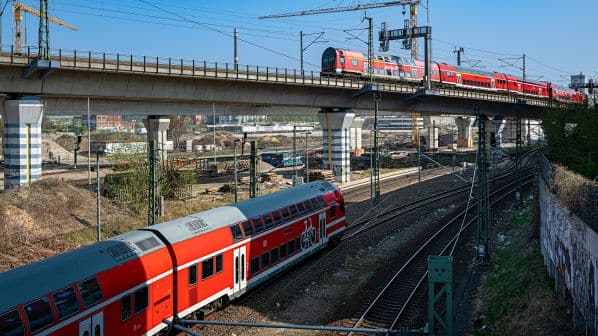MOFAIR, the association representing German private passenger operators, has called for action from the government to reform and invest in the national rail network.
Describing 2023 as “the year of decisions,” Mofair has called on the government to implement its own policy to restructure German Rail (DB) to create an independent infrastructure manager and, as also promised in the government’s own coalition agreement, to prioritise rail infrastructure investment over road with substantial new funding made available to overcome decades of underinvestment.
Mofair says two things are necessary. First is structural change at DB to ensure infrastructure manager DB Network is geared towards quality and capacity. The current profit and loss transfer agreements between the infrastructure manager and the DB holding company should be terminated so that the infrastructure manager is a standalone business and does not provide cash support directly or indirectly to DB’s operating subsidiaries.
The government’s own coalition agreement in 2021 explicitly stated the intention to remove the DB Network and DB Station and Service businesses from the DB holding company and to place them in a new business “oriented to the public good,” albeit still owned by DB.
The second major change called for by Mofair is a restructuring of the way the government funds rail infrastructure. The association estimates there are currently 189 funding pots, each with sometimes contradictory funding requirements and verification procedures. Mofair is calling for a simple approach with two long-term funds, one for infrastructure maintenance and the second to fund new construction to increase network capacity, which the association says is urgently needed.
Mofair notes that the government received the report from its Rail Acceleration Commission in December 2022 and federal transport minister, Mr Volker Wissing, welcomed its 70 recommendations. One key recommendation was adopting a new approach to infrastructure financing based on the Swiss model, with one fund for maintenance and second for new construction to ensure continuous financing and long-term planning security for the rail sector and the supply industry. A significant shortening and streamlining of the planning and approval process for new infrastructure is also necessary, according to Mofair, if the government is to meet its target of shifting traffic to rail.
Mofair also believes the official position concerning infrastructure investment requirements is over-optimistic, as published in the government’s Infrastructure Status and Development Report based on the Performance and Financing Agreement. The association says that it is also at odds with the detailed analysis of the state or rail infrastructure undertaken by DB Network.
While DB and Wissing have announced a strategy to achieve a "high-performance network" by 2030, the lack of funding means this is unlikely to be achieved.
Mofair notes that the preferred approach of closing entire sections of the network for months to rebuild them results in some components being replaced before the end of their normal economic lives, which under the current financial arrangements cannot be funded by the federal government. This would need both a change in the rules and an increase in funding over and above simply replacing life-expired equipment.
Rail vs road
Mofair’s proposed changes come as concern grows within the rail sector and in political circles that the government will not deliver on its ambitious plans for rail investment.
The coalition agreement of 2021, which brought together the previously untried three-way coalition of the Social Democratic Party (SPD), the economically more liberal Free Democratic Party (FDP) and The Greens, explicitly states that rail infrastructure investment will increase at the expense of the road building budget. The agreement also prioritises investment to improve network performance while introducing a nationwide regular interval timetable (Deutschland Takt) and supporting major growth in passenger and freight traffic by 2030.
The coalition agreement referred explicitly to the restructuring of DB Networks, saying that “profits” from the infrastructure should “remain” within the new infrastructure manager for the common good.
The FDP is perceived to have subsequently blocked the emphasis on rail investment with FDP minister Wissing instead publicly promoting further road building in recent weeks.
The January issue of IRJ includes an in-depth examination of the challenges for German rail in 2023.

